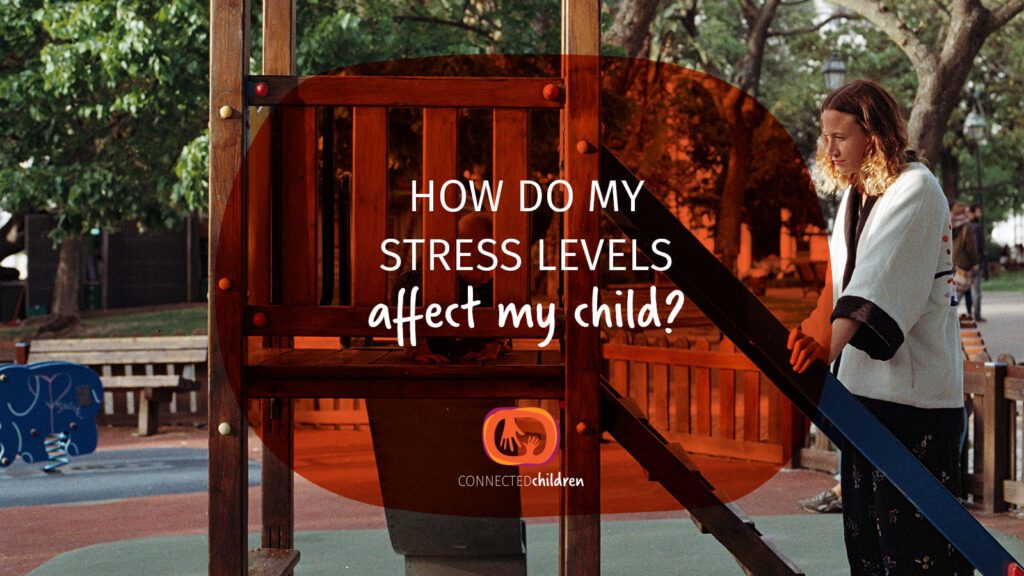
How Do My Stress Levels Affect My Child?
Parents have busy, full lives these days, juggling work, family and social commitments and somewhere in there trying to find time for themselves. Most parents report feeling overwhelmed and exhausted at times, wondering how they can meet their kid’s needs. Many parents report they can be short tempered with their kids or that they are rushing them through daily routines and activities. Which leaves them with the question when they catch their breath at the end of the day.
Is the stress I feel each day affecting my child?
Is life satisfying for me and is this the best way to help my child thrive? Is what I am doing positively affecting my children? There are two camps when considering parenting styles related to stress in a child. One where the emphasis on the children, being so precious, result in parents feeling guilt about their busy lives, not giving their child enough and rushing them through life. The other style is often called ‘helicopter parenting’ where parents think they have to organise every emotion their child has. Parents feel they have to be there and attuned at all times, giving little freedom for the child to grow and develop through unstructured play.
How do you approach your parenting?
Do you think this is a way for your child to thrive emotionally? If you want to think about this some more, let’s consider some key concepts… In a study looking at cortisol levels in babies during immunisation, it was found that when parents were overly stressed, this impacted upon the cortisol levels in the babies. This study showed a clear link between the emotions of the parent affecting the child. This makes sense both ways, think about the joy your child experiences if you excitedly run into their room in the morning saying ‘Surprise! We are going the beach today!’.
Of course, it makes sense that the emotions of one person affects the emotions of another.
This is especially true as parents, children rely on their parents to ‘set the emotional thermostat’. They are counting on their parents to help make sense of their world and themselves in it. It is an incredible opportunity given to all parents. So how do parents reduce the impact of their stress on their children? This is may not be so easy to achieve. First, accept that you will affect them but also remember this may give them experience around relationships with others. There may be times of stress, but this can also be an opportunity to practice reconnecting after stress and managing how to approach that. It is true for all families that children’s experience of happiness and quality of life is rarely better than the experience of quality of life than the parents. Parents who suffer a lot may wrap around their children in an attempt to regulate themselves. So to me the key question is, how good are parents at taking care of themselves? When parents take care of themselves, happy families just flow. This may not be so easy to achieve.
While you may feel this is about you, actually this is about life today.
Since the 1950’s parents play less with their children, they go on picnics less and meet less frequently at the dinner table as a whole family. So think about what are the basics in life, as these can be the things that can go first. What can you do about this? Consider what do you enjoy? Is there capacity for your children do this with you also? Can you get some strawberries and find a spot by the river, pull out a picnic blanket and watch the boats go by.
How can you bring your child into something that is meaningful for you?
Why do you want to do this? You are a person first, who is a parent second. If you are attuned to yourself as a person this can help you to become more rounded as a person and parent. If you let your other life roles go, friends, hobbies, exercise, this means you are not feeding yourself. Therefore, this may mean that you cannot feed your child. Think of yourself as the watering can, nurturing a garden, your child. How can you put water into that can to allow you to nurture your child?
Another point to consider, is to invest time attending to your own ‘parenting wise mind’, reflecting on your parenting. If you do not spend time reviewing your parenting experiences and how you approach this day to day, then it can result in a mismatch between your values and your parenting approaches. If you are taught firm behaviour management is the way to go around bedtime, but you get stressed leaving them to cry, then you need to give yourself permission to do it your way. Your parenting needs to be in line with your values. Another key factor in helping the family to ‘flow’ is to ensure you and your partner have time to reconnect. This may just mean a quiet date night at home with a glass of wine, time to chat and relax.
Life is full these days and when considering supporting your child, there are several ways to approach this. Hopefully this article has been helpful in harnessing your expertise.
